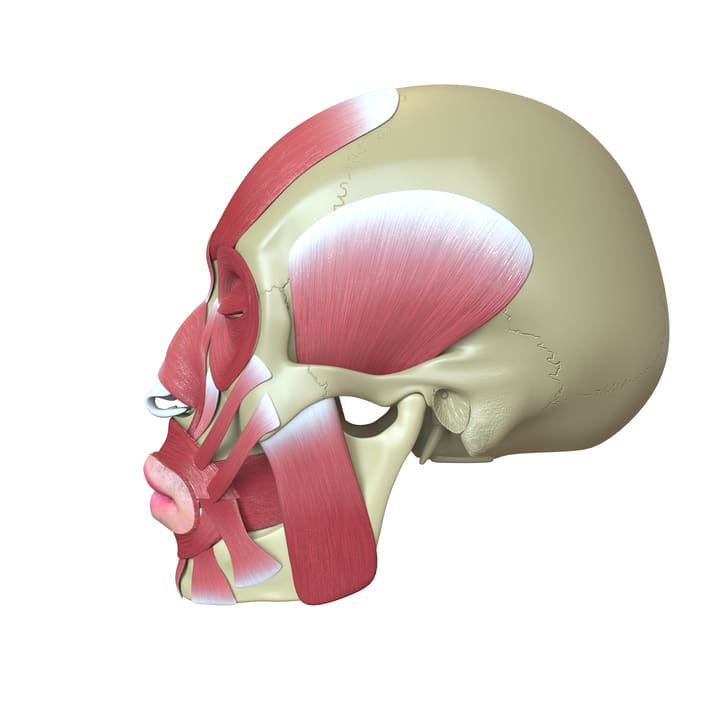Interdisciplinary Approach for TMJ Disorder Patients
Chiropractic Dentistry TMJ Treatment San Diego
By Dr. George Georgaklis. Originally published in San Diego Chiropractic Journal.
“TMJ” syndromes can be classified into TMJ Dysfunction Syndromes or Myofascial Pain Dysfunction Syndrome. These symptoms should be considered separate and distinct clinical entities.
Temporomandibular joint syndromes have their etiology in the joint itself or in a specific occlusal disorder. Intrinsic joint pathology may be ligamentous, capsular, bony, degenerative, etc. Occlusal disorders associated with temporomandibular joint syndromes generally depend upon the presence of a centric discrepancy causing pterygoid tenderness and pain in the joint itself.
Myofasclal pain syndromes affecting the masticatory musculature are unrelated to the occlusion and are generally not amendable to occlusal therapy. These myofascial pain syndromes are medical entities which can affect single muscles or large muscles anywhere in the body. When myofascial pain becomes spastic, the term Myofascial Pain Dysfunction applies. MPD syndromes are also a psychophysiology condition primarily caused by tension habits that create spasm of the masticatory musculature with resultant occlusal disharmony.
Of the two dysfunction syndromes, myofascial dysfunction is by far more common. Muscle pain in other parts of the body can refer pain to the face, head, or neck, thus causing hyper excitability of the stomatognathic musculature, which may secondarily induce myospasm and myofascial pain syndrome. When this occurs, the patient may consider his masticatory pain dysfunction to be his primary problem, when in fact, it has occurred as a secondary effect of a previous problem.
This is where the chiropractor and dentist need to work simultaneously. For example, while a dentist is treating a MPD patient with an orthopedic repositioning appliance (splint), it is essential that the chiropractor help reduce or eliminate the pain and muscle spasm; whether they are a primary or secondary effect. Otherwise, a circuit effect may occur causing a recurrence of symptoms.
In addition to head, neck and face pain, the other more common signs and symptoms often associated with TMJ and Myofascial dysfunction include shoulder pain, tinnitus, vertigo, otalgia, decreased auditory acuity, retro-orbital pain, non-specific dental pain, trismus pain on masticatory function, TMJ crepitation and/or click, pharyngeal pain or a “foreign body” feeling in the pharynx, sinus congestion and/or pain, fatigue and depression.
Most people with whiplash have TMJ/MPD syndrome and in many cases it goes undetected. Unfortunately late diagnosis can make conservative splint therapy less successful.
The typical TMJ patient is a female between the ages of 20 and 50, who has been examined by a variety of medical specialists. An otolaryngologist would have been consulted for symptoms focusing on the ear and sinuses, the neurologist for the chronic headache and neck pain and the orthopedist may have also been consulted for the neck pain and crepitation of the joint. In the absence of clinical findings, the patient is most often told to consult with a psychiatrist for an evaluation of a possible psychosomatic origin of her chief complaints.
Many times the patient is simply told that they must “learn to live with their pain”. In some instances, where the patient is unwilling to believe that he or she is suffering from a psychosomatic illness, various aggressive and non-reversible surgical procedures are performed out of pure desperation. Such procedures include alcohol injections into the trigeminal complex and neuro-surgical procedures. In one case, an exploratory craniotomy was suggested. Sad, but true.
It is unfortunate, but many patients are misdiagnosed. FACT! Chiropractors and dentists can help these
patients. Let’s consult each other!
Dr. George C. Georgaklis is a dentist in the San Diego area who has experience in working with chiropractors to treat patients who have TMJ symptoms.
Chiropractic Dentistry TMJ Treatment San Diego | Make an Appointment
You don’t have to suffer through the pain! Make an appointment at Dr. Georgaklis’ office today by calling (858) 552-1223. Stay connected, like us on Facebook!

